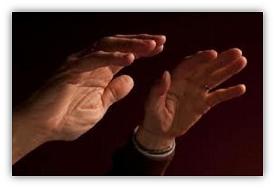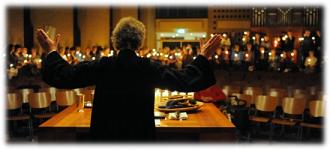Whose Is the Blessing?
Whose Is the Blessing?
“The Lord bless you and keep you; the Lord make his face to shine upon you and be gracious to you; the Lord lift up his countenance upon you and give you peace.”
Numbers 6:24-26
Whose is the blessing? Does it belong only to the minister, or can the sermon reader, the candidate and the students also give it to the congregation in the worship service? You may remember that some time ago this question occupied many a church goer. From my earliest memory, only ministers of the Word were permitted to lay the blessing on the congregation at the end of the worship service. If a non-minister was leading the service, it was expected that he change the words of the priestly blessing into a “prayer blessing”. (May the Lord bless…) But that has changed.
In this article, I first want to trace some of the developments that made this change happen. We will look at some discussions that took place and at the arguments, pro and con, that were used to bring the change about. From these, I want to shed some light on the practises of today.
Zig-zag Policy⤒🔗
When preparing for this article I looked up the discussions we had among ourselves about the “church elder’s blessing”. I was planning to provide a short report of the discussion. In the end, I decided that the reader would not appreciate that, because the issue was dragged from one synod to the next. Each time the churches were advised to make miniscule changes in their practise; or rather, they were told to change their practise.
 In my youth, if our congregation was served by a candidate minister on Sunday, the blessing was spoken as a prayer (changed form). But in 1994, when I was a ministerial student and had preaching consent, I was told by some of the churches to pronounce the blessing in the form written in the Scriptures … thus unchanged.
In my youth, if our congregation was served by a candidate minister on Sunday, the blessing was spoken as a prayer (changed form). But in 1994, when I was a ministerial student and had preaching consent, I was told by some of the churches to pronounce the blessing in the form written in the Scriptures … thus unchanged.
In the beginning of my ministry there were churches which had elders open and close the worship service when the minister was absent. This shows that the policy was not very clear. It indicated to the person in the pew that the leadership of the churches at the Synod had a zig-zag policy – sometimes the policy was “this” and sometimes the policy was “that”.
But that changed at the General Synod of Leusden 1999 (of the Reformed churches (Liberated). It ruled that from here on, any person who was leading the worship service would be allowed to pronounce the blessing unchanged: that is, in the words the Bible uses. Did that mean that this synod, after all these years of discussion, had reached a consensus on how it should be done?
The truth is otherwise: the discussion did not end because the members of Synod agreed, but because the discussion reached a dead end. It had run stuck! The explanation given by the synodical committee in 1999 (adopted by the Acts of Synod [Art.48]) is informative. There the committee states that since the beginning of the discussion in 1975 there has been a continual pendulum swinging between two lines of thought.
The first line of thought ties the blessing to the office. Proponents use Numbers 6 to say that the laying on of hands is part of the service of reconciliation, which in the Old Testament was given to the priest (the house of Aaron only). In the New Testament, the service of reconciliation comes to the people in the preaching of the Word, which is given to the apostles by the Lord. Later this passed onto the others who qualified for the office of preaching the Word. We know them as ministers.
The second line of thought ties the blessing to the Word. Proponents of this line say that in every worship service the Lord Jesus is present with his Word. There are, they say, different ways in which the Word is brought; but the Word is brought, and thus reconciliation becomes part of these worship services. And it is because of this that anyone appointed by the Consistory to bring the Word automatically receives the right to use the blessing as written in the Scriptures.
From this information you could get the impression that the swinging of the pendulum has stopped, and that the second line of thought was chosen. But this is not true at all.
The background of the decision of Synod Leusden was the conviction that the discussion had to be decided in one way or another.
Using the words of General Synod Zuidhorn 2001, “From the 20 years of discussion, it became clear that substantive arguments from the Bible, confessional and theological data, did not lead to convincing decisions.” This is the reason why the next two synods, Synod Berkeland-Rodenrys 1996 and Synod Leusden 1999, concentrated on practical solutions on which, finally, some agreement was found (Acts art. 47, decision 2 ground 1).
Taking the Blessing “Along”?←↰⤒🔗
We left the principled discussion for what it was and made a decision on practical grounds. This is in essence what the synods said. This is what factually happened in 1996 and 1999! But we are now a few years down the path of time since those synods. And time did not stand still as far as changes in the realm of the blessing are concerned. No, not at Synod for after General Synod Zuidhorn dismissed all appeals, the blessing did not reappear on the Synodical agenda. But that does not mean that nothing has changed as to how the blessing is used.
Lately I hear tidings, time and again, of ministers who “take the blessing along”. Ministers who, outside of and apart from the worship service, lay on hands and pronounce the blessing.  For example, at the family meeting that precedes a funeral service of a brother or sister of the congregation. Some do it after pastoral visits to people who have struggles. We can mention more and other instances where this takes place. I myself have been asked why I do not close with the blessing at the end of Bible study hour at a retirement home.
For example, at the family meeting that precedes a funeral service of a brother or sister of the congregation. Some do it after pastoral visits to people who have struggles. We can mention more and other instances where this takes place. I myself have been asked why I do not close with the blessing at the end of Bible study hour at a retirement home.
But this is not where it stops. It goes further. Already in 2004 Michael Mulder wrote an article in which it he noted that brothers and sisters, outside and away from the worship service, bless each other on a regular basis and without trepidation. We hear of this happening in different ways. For example, we hear of a father who each evening brings his children together in order to bless them. We hear of courses being taught to learn what it is to have a “blessed life” and how to do the blessing. Blessing each other is a concrete part of these courses. You can learn it by practising it, and in this way improve your spiritual life. There is a Dutch song which is very popular that begins: “I bless you in Jesus name”. It is taught by parents to their children. Is that really pleasing to the Lord?
Blessing Fulfilled←⤒🔗
I believe that the strength of the article that Mulder writes is that he tries to answer the questions using the Bible. He gives the Biblical points that pertain to the blessing. His basis is that the blessing comes from the Lord and belongs to him. God is the subject of the blessing and he distributes this blessing only to those who live in the communal bond with him. Besides, it is by grace only that a person may receive this blessing, and that grace, contained in the covenant between God and his people, is clearly expressed at the same time.
When it comes to the blessing in Numbers 6, Mulder says that it is of the greatest importance that the blessing was given in close proximity to the altar, and that it was given only after the burnt offerings had been made. Thus, it becomes apparent in this way that God’s blessing comes only to his people in the context of the communal bond that was experienced and maintained in the temple service. The blessing has an origin: its starting point is in God. At the same time, the blessing points to the medium by which it comes to the people – the service of reconciliation.
In the New Testament the lines continue clearly. Just as in the Old Testament the blessing came to the people via the sacrifice and the altar, so in the New Testament the blessing comes to us via the sacrifice and work of Jesus Christ. In fact, this blessing is the fulfilment of the blessing which was promised to Abraham long ago. This blessing contains the promises that God will be with those who through faith are attached to Christ. It is through him that there is grace, love, and peace from God.
In the Church Service←⤒🔗
What does this all mean regarding the practise of “taking the blessing along”? To start with, Mulder strongly emphasizes the meaning of the blessing which we receive in the church service. “The more the church service becomes the centre of our life, the more we will experience that the blessing of the Lord enriches our life. In the worship service, the Lord Jesus feeds us all, as God’s people, with the Word of God. He feeds us with his own hand. In this way I see what it means that God wants to be my God. That is what is essential for the blessing of which the Bible speaks.”
The words of the priestly blessing of Numbers 6 have always had a special place among the people of God. In the Old Testament, these words were only to be spoken by office bearers who were specially appointed by God himself, and then only in the context of the worship service in which the service of reconciliation was of the first importance! In agreement with this, the New Testament Church could grant the New Testament office bearers the right to speak those words at the end of the service in which the service of reconciliation had been preached; it was only at the service of reconciliation that God, from olden days on, had connected his promise of blessing.
Mulder concludes by saying that the blessing spoken in the Name of the Lord may only be laid on the congregation in the context of the service of reconciliation where the promises of the Lord are underlined. By the laying on of hands, the promises of the Lord become visible and are brought near. In the blessing, God is asked to fulfill his promises, and at the same time the congregation is assured that the Lord will do as he has promised. It is because of this that we are always taught that we have to receive the blessing with a believing heart. Also, when the words are spoken, the hands are to be used, because the blessing includes both hearing and seeing.
The Ministry of Reconciliation←⤒🔗
It is very evident that Mulder also emphasizes how much the blessing is connected, by the Bible, to the ministry of reconciliation. For me personally it means that I do not take the blessing with me, and that I should not pronounce it or lay on hands outside of and away from the worship service. I should not use it in family gatherings which precede funerals of church members. I should not use it on pastoral visits, or during Bible study at a senior’s home, because the ministry of reconciliation is only administered where the congregation is together to hear the Word of Reconciliation. It is evident to me that we should be able to find agreement on this point and on these grounds. For, though the struggle I summarized earlier was about how to administer the blessing, they never dealt with the location where the blessing was to be administered. My point is that both those who tied the ministry of reconciliation (i.e. the blessing) to the office bearers and those who tied the ministry of reconciliation to the bringing of the Word were sure that the ministry of reconciliation was to be administered in the midst of the congregation.
Outside the Church Service←⤒🔗
But does this mean that the blessing is only to be used in the church services? In my opinion, the strongest point of Mulder’s article is that he emphasizes how valuable it is that Christians amongst themselves in common, everyday activities should express and wish each other the blessing of God on greeting and departing. It is self-evident that believers, in the days when the New Testament was written, greeted each other and prayed a blessing to one another. It was sometimes even accompanied by a gesture, like the holy kiss.  But, at the same time, he states that the laying on of hands is not mentioned in the New Testament as part of the everyday blessing. The laying on of hands was connected to a blessing that had a special character. The two times Paul mentions the laying on of hands it is connected to the way in which Timothy was installed/prayed for as officer. These were ceremonies in which Paul took part (1 Tim 4:14 and 2 Tim 1:6). It must always be clear that human hands do not have control of the blessing - the blessing belongs to the Lord!
But, at the same time, he states that the laying on of hands is not mentioned in the New Testament as part of the everyday blessing. The laying on of hands was connected to a blessing that had a special character. The two times Paul mentions the laying on of hands it is connected to the way in which Timothy was installed/prayed for as officer. These were ceremonies in which Paul took part (1 Tim 4:14 and 2 Tim 1:6). It must always be clear that human hands do not have control of the blessing - the blessing belongs to the Lord!
This article was translated by Leo Rozema

Add new comment